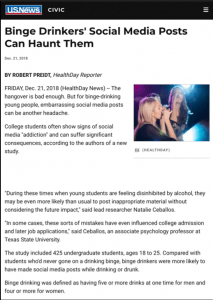I am part of an interdisciplinary team exploring the relationship between social media use and well-being. This new study, “Collegiate Binge Drinking and Social Media Use Among Hispanics and Non-Hispanics” sought to better understand students’ social media habits in relation to drinking. An online survey demonstrated that historical binge drinkers had greater intensity scores for Snapchat, Instagram, and Twitter, and were more likely to report using social media and alcohol concurrently, even while intoxicated (ps < .05). Compared with Hispanics, non-Hispanics exhibited greater intensity of use for Instagram (ps = .001). Quantity and frequency of alcohol use was positively correlated with intensity scores for Snapchat, Instagram and Twitter (ps < .001), as well as social media addiction (p < .001), and use of social media while drinking and after intoxication (ps < .001). Age at first alcohol use and first intoxication were negatively correlated with use of social media while drinking and after intoxication (ps < .001). The results of this study may inform intervention efforts aimed at curbing hazardous college drinking by highlighting a context in which students could be exposed to harm-reduction messages presented through social media.
In addition to being published in a journal with a high impact factor rating (2.616), this research has been featured on several news outlets, including U.S. News & World Report (see below) and Psychology Today.

